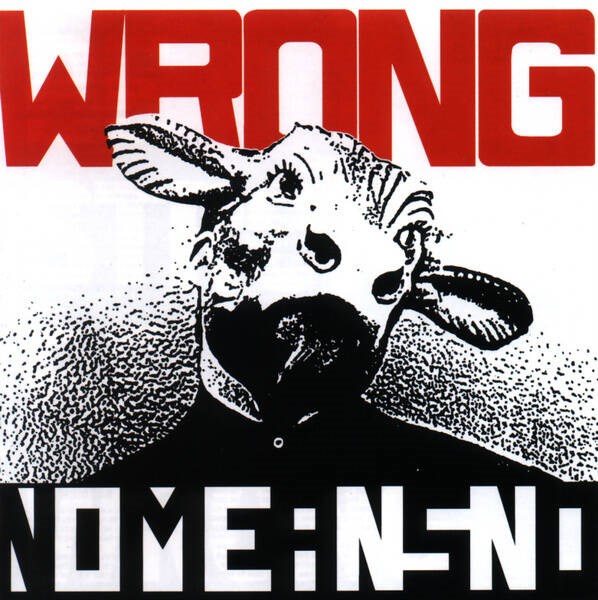Jason Lamb’s NoMeansNo: From Obscurity To Oblivion sheds light on band’s unknown history

Photo via Times Colonist.
The Victoria punk trio NoMeansNo spent their career balancing notoriety and anonymity, but thanks to a new book by the local broadcaster Jason Lamb, the former is beginning to outweigh the latter.
Lamb wrote NoMeansNo: From Obscurity To Oblivion, An Oral History as a gift to the Victoria-based band, who remained outside of the mainstream from its creation in 1979 until its retirement in 2016. However, the on-air host of The Zone radio station also wanted to recognize NoMeansNo’s status as one of the best underground punk acts in history. Lamb interviewed hundreds of people for the book — the majority of whom were musicians.
Though adored locally during the early part of their career, founders Rob Wright (bass), John Wright (drums), and Andy Kerr (guitar, vocals) remain somewhat inaccessible for newcomers to the punk genre. Despite this, Lamb wants to bring this band new popularity and brush the dust off of their sprawling discography.
“It’s a constant struggle to try and figure out how to show other people how good [NoMeansNo] are without turning them away,” Lamb said in an interview with The Martlet. “Because, you know, where do you start?”
From Obscurity To Oblivion, which was released on Jan. 2, tackles all facets of NoMeansNo’s career, including its induction into the Western Canadian Music Hall of Fame in 2015 and praise from members of Black Flag, Fugazi, Pearl Jam, Soundgarden, and Dead Kennedys.
The late ‘70s was a heady time for Victoria’s punk scene. After witnessing an especially brutal D.O.A. concert at UVic’s Commons Block in 1979, brothers Rob and John Wright were inspired to form a band of their own.
“There were a bunch of rugby jock assholes there, and they’re trying to start fights and the D.O.A. were flicking blood on them with guitars,” Lamb said. “Rob and John came out of that going like ‘Holy shit, this is the stuff we like, we want to be part of this.’”
UVic was instrumental in more ways than one; Rob and John both worked at the university during the early ‘90s while continuing to play shows on campus — including some at the Commons Block — before relocating to Vancouver.
“It opened up both their minds to this whole idea of punk rock, nihilism, and doing what you want,” Lamb said of their time in Victoria.
In their early days, punk wasn’t their genre of choice, but NoMeansNo eventually began to stand out. “They were taken in by the punk rock world, almost on accident in a way,” Lamb said. “They could have ended up being an art band that would have probably not gotten the same recognition.”
According to Lamb, NoMeansNo belonged to a niche group of musicians in the area. “There was this weird little scene in Victoria [during the 80’s] of these quirky bands that all sounded completely different from one another,” he explained.
Trained as jazz musicians, they brought complexity and political anger together on their albums. “They had a lot of musical influences that went beyond punk rock,” Lamb said.
Theirs was a successful formula, and NoMeansNo went on to create some of the most widely praised albums of the post-hardcore genre, including 0 + 2 = 1 (1991), Why Do They Call Me Mr. Happy? (1993), and their greatest success according to critics and fans alike, Wrong (1989).
It was during his mid-teens that Lamb began attending basement shows and he eventually became fascinated by punk rock. The broadcaster hosted The Punk Show on The Zone for over 10 years before wrapping the program last year in order to complete the book.
Lamb’s personal connection to the band started in the late ‘80s. “NoMeansNo, was the second or third band I ever saw live. I became a fan immediately, seeing them every chance I got, and then started buying records.”
Many of those records are worth upwards of $200 today. NoMeansNo has a large cult following among music collectors, despite its members being stubborn on occasion, intentionally coy, and politically demanding on and off stage. This is why they are hard to get into — and why they’re groundbreaking and globally loved. NoMeansNo’s innovative, independent approach weaves intricate rhythms and melodies into punk rock songcraft, without the aid of a major record label for publicity and promotion.
“They’ve had so many different sounds, styles, and albums. Two minutes long, really fast, hardcore punk songs, to 12-minute-long opuses that would just throw a million different styles in all at once,” explained Lamb. “It just came from training and influence, and that’s not an easy thing for people to just jump into.”
His love for NoMeansNo was the impetus behind the book, though Lamb had his reservations. “Am I gonna find out anything real here?” he said. He quickly realized there was much to uncover. “Once the two brothers gave me the green light to do it, everybody in their world was happy to talk to me.”
As Lamb closed the interview, he discussed the growing state of Victoria’s punk community with advice for local concert-goers. “I would say to start local. … There’s nothing better than a live show. Find out what’s going on here in Victoria, and start there. You’ll be surprised.” He emphasizes that without support from fans, the punk community in Victoria would not continue.
When asked if another band similar to NoMeansNo could find success again, on its own terms, from a home base such as Victoria, and without the aid of streaming platforms, Lamb answered affirmatively. A final reason why you should support your favourite punk band — perhaps their fame will reach that of NoMeansNo’s!






